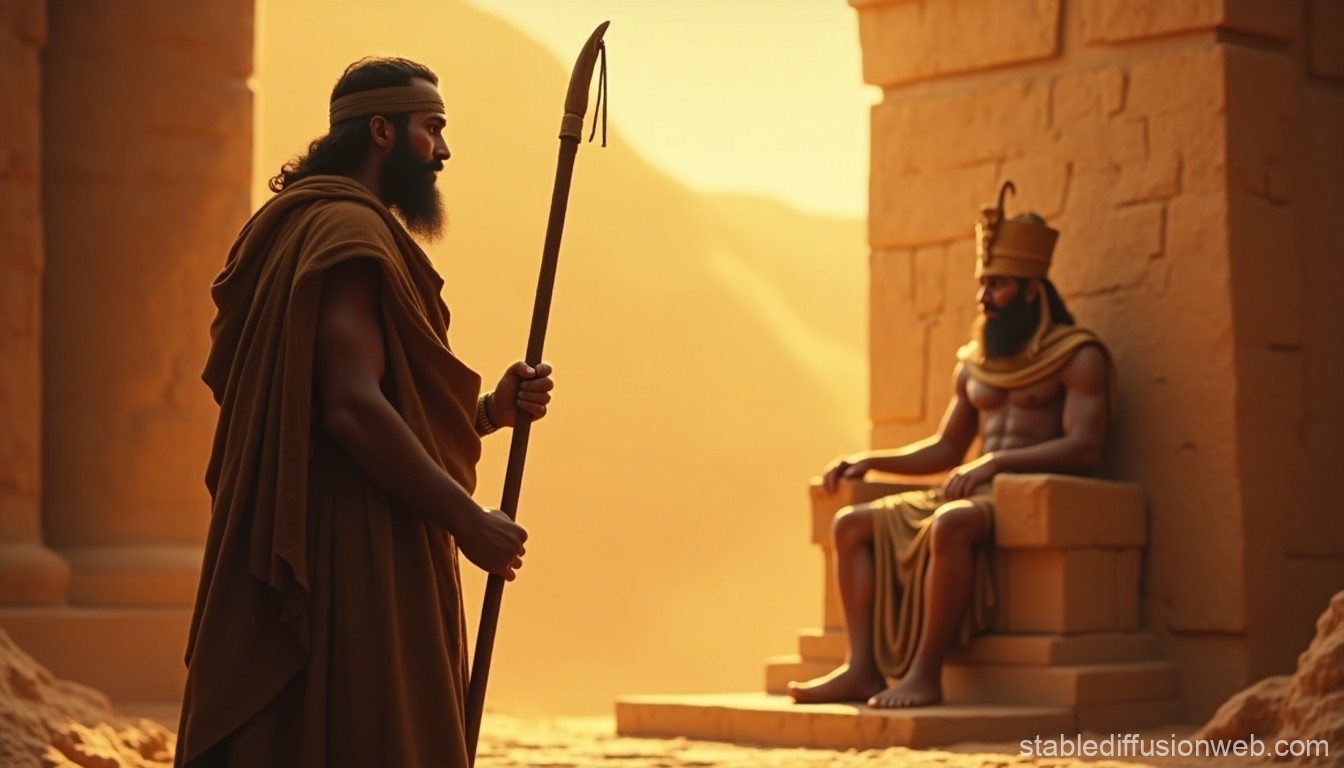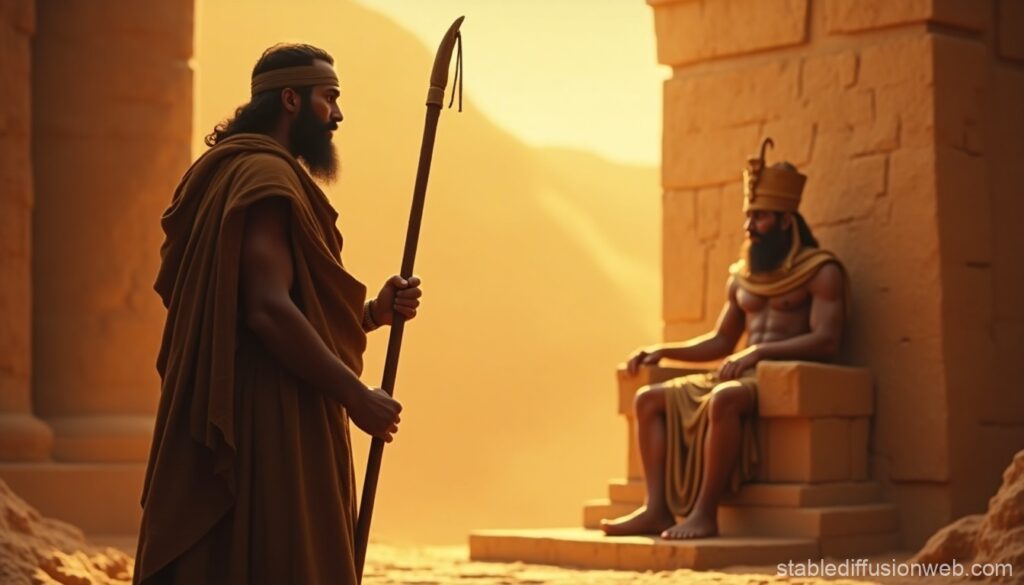Physical Address
304 North Cardinal St.
Dorchester Center, MA 02124
Physical Address
304 North Cardinal St.
Dorchester Center, MA 02124
With Michael Walker
With Michael Walker

A message to the Skeptics

It began long before Moses ever stood before a Pharaoh. Long before bricks were laid in Egypt or a rod turned to a serpent. It began with a promise—a prophetic whisper spoken to a man named Abram, whom God would rename Abraham.
“Know for certain,” the Lord told him, “That your descendants will be strangers in a land that is not theirs, where they will be enslaved and oppressed for four hundred years. But I will also judge the nation whom they will serve, and afterward they will come out with great possessions.” (Genesis 15:13–14)
And so the stage was set—not just for affliction, but for deliverance; not just for bondage, but for the glory of YHWH to be made known.
Joseph: When Egypt Honored the God of Israel.
Generations later, the story took root in Egypt. Through a series of divine dreams and providential turns, Abraham’s great-grandson Joseph was raised to power in the land of the Nile. And the Pharaoh of his day recognized something few kings ever do:
“Can we find a man like this, in whom is the Spirit of God?” Pharaoh said. “Since God has shown you all this…” (Genesis 41:38–39)
Joseph’s God was honored. His family was given the land of Goshen. Israel was welcomed as guests, not slaves.
Egypt, for a time, knew favor because it respected the God of Joseph.
The Forgotten Past: When a New Pharaoh Rose
But memory fades in the palaces of men. A new Pharaoh rose—one who “did not know Joseph.” (Exodus 1:8) He knew of him, perhaps, but refused to regard him or his God. Suspicion replaced gratitude. Fear replaced favor. The children of Israel were too numerous, too different, too dangerous.
The Pharaoh summoned the Hebrew midwives. “Kill the sons,” he said. “Let the daughters live.” A silent genocide cloaked in strategy. The midwives, fearing God more than the king, resisted.
But the seeds of institutional hatred had been sown.
The Next Pharaoh: Drowning the Future.
As if that weren’t enough, a new Pharaoh intensified the war. When subtle orders didn’t suffice, he made the violence public:
“Every son who is born you are to throw into the Nile…” (Exodus 1:22)
This wasn’t just cruelty—it was a declaration: “We will erase their strength, their future, and their God.”
But in the very river of death, God floated life. Moses, a Hebrew baby, was drawn out of the water by Pharaoh’s own daughter—raised under the very roof of tyranny.
Even in darkness, God plants deliverance.
Inherited Hate: The Pharaoh of Moses
By the time Moses returned, Egypt was ruled by a Pharaoh who had inherited centuries of rebellion. He wore a crown passed down by kings who had enslaved God’s people, drowned their sons, and resisted His name. This Pharaoh wasn’t just personally hardened—he was culturally indoctrinated, throne-trained to despise the God of Israel and the people called by His name.
His heart was already heavy with pride, fortified by politics, and calloused by cruelty.
When Moses said, “Thus says the Lord, let My people go,” Pharaoh didn’t just say no—he scoffed.
“Who is the Lord, that I should obey His voice? I do not know the Lord…” (Exodus 5:2)
The Process Begins: The Hardening of Pharaoh’s Heart.
This Pharaoh’s resistance wasn’t random—it followed a progressive, divine timeline. Scripture records nineteen moments where Pharaoh’s heart is described as hardened, with three different Hebrew words, used at different stages, showing who did the hardening and how.
Let’s follow the timeline of the hardening—as it unfolds:
1. Exodus 4:21 — God says He will strengthen Pharaoh’s heart
Hebrew: חָזַק (chazaq) — to strengthen, fortify
“I will strengthen his heart…”
Before Pharaoh even says a word, God tells Moses what will happen. Not to override free will—but to show that Pharaoh’s coming stubbornness will be part of God’s plan.
2. Exodus 7:3 — God says He will make Pharaoh’s heart harsh
Hebrew: קָשָׁה (qashah) — to make cruel, stubborn
“I will make Pharaoh’s heart harsh…”
This is God exposing what Pharaoh’s defiance will ultimately become—ruthless, unyielding.
3. Exodus 7:13 — Pharaoh’s heart is strengthened (passive)
Hebrew: חָזַק (chazaq)
“Pharaoh’s heart was strengthened…”
No direct agent—Pharaoh’s own pride and resistance are being reinforced.
4. Exodus 7:14 — Pharaoh’s heart is weighed down
Hebrew: כָּבֵד (kaved) — to become dull, unresponsive
“Pharaoh’s heart is stubborn…”
He begins to ignore the signs. His heart is heavy, insensitive to truth.
5. Exodus 7:22 — His heart is strengthened again (passive)
Hebrew: חָזַק (chazaq)
Even when his magicians copy Moses’ sign, Pharaoh becomes more confident in rejecting God.
6. Exodus 8:15 — Pharaoh hardens his own heart
Hebrew: כָּבֵד (kaved)
After God removes the plague, Pharaoh chooses rebellion.
7. Exodus 8:19 — His heart is strengthened again (passive)
Hebrew: חָזַק (chazaq)
Even when his magicians admit, “This is the finger of God,” Pharaoh won’t listen.
8. Exodus 8:32 — Pharaoh again hardens his own heart
Hebrew: כָּבֵד (kaved)
Despite God’s patience, he refuses to yield.
9. Exodus 9:7 — Pharaoh’s heart remains weighed down
Hebrew: כָּבֵד (kaved)
10. Exodus 9:12 — Now God begins to strengthen it Himself
Hebrew: חָזַק (chazaq)
The shift begins. Pharaoh has refused too many times. Now God strengthens him in his chosen rebellion.
11. Exodus 9:34–35 — Pharaoh continues to weigh down his own heart
Hebrew: כָּבֵד (kaved)
After the plague lifts, Pharaoh sins again. His repentance was false.
12. Exodus 10:1, 10:20, 10:27 — God continues to strengthen his heart
Hebrew: חָזַק (chazaq)
God reinforces Pharaoh’s defiance—not creating it, but confirming it. His will is now fortified.
13. Exodus 11:10 — God has now fully taken over the hardening
Hebrew: חָזַק (chazaq)
14. Exodus 14:4, 14:8, 14:17 — God strengthens Pharaoh for judgment
Hebrew: חָזַק (chazaq)
Even after letting Israel go, Pharaoh is emboldened one last time to chase them. God leads him into judgment at the Red Sea.
The Exodus: Sovereignty Through Free Will
Ten plagues. A nation shattered. A sea split. And a people freed.
Israel walked out of bondage, not because Pharaoh’s free will was canceled—but because God’s sovereignty works even through the free choices of man.
Pharaoh lost his son, his army, and his throne—not because God robbed him of choice, but because God gave him exactly what he wanted: a hardened stance against the living God.
And in that divine justice, God proved a timeless truth:
No human rebellion can outmaneuver the promises of God.
Final Word
From Abraham’s promise… to Joseph’s rise… to Pharaoh’s hatred… to Moses’ call… to Israel’s freedom—the story never left God’s hand.
Not once did He contradict Himself.
Not once did He force evil.
He simply allowed the evil man to walk his chosen path… and made that path serve His glory.
That is true sovereignty.
That is our God.